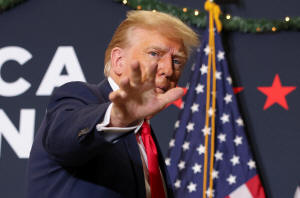Trump legal clashes reach US Supreme Court as 2024 election nears
 Send a link to a friend
Send a link to a friend
 [December 21, 2023]
By John Kruzel and Andrew Chung [December 21, 2023]
By John Kruzel and Andrew Chung
WASHINGTON (Reuters) - Donald Trump transformed the U.S. Supreme Court
during his four years as president. Now the 6-3 conservative majority he
cemented will confront a handful of cases that may determine whether the
Republican can reclaim the White House.
The court is poised to play an outsized role in the 2024 presidential
election by hearing disputes over Trump's role in the run-up to a Jan.
6, 2021, attack on the U.S. Capitol in which his supporters tried to
stop Congress from certifying Joe Biden's election victory.
The politically explosive cases have the potential to once again thrust
the country's highest court into the election limelight almost a
quarter-century after its fateful 2000 ruling effectively handed the
White House to Republican George W. Bush.
"What is extraordinary this year is that the court might have a huge
effect before the election, especially in determining whether Donald
Trump can be on the ballot and whether the federal criminal prosecution
of him can go forward,” said Erwin Chemerinsky, dean of the University
of California Berkeley Law School.
The justices generally avoid public comment on cases or political
matters outside of their actual rulings, although the conservative
majority has increasingly moved American law to the right, handing
conservatives wins on abortion, guns and affirmative action since 2022.

Trump has vowed to appeal a Tuesday ruling by Colorado's top court
disqualifying him from appearing on the state's primary ballot, which if
taken up by the justices would be a landmark case in the broader effort
to disqualify Trump from state ballots in the Nov. 5 election.
A database of the legal analysis blog Lawfare maintains that Colorado so
far is the only state to disqualify Trump from its ballot out of 32
states where Trump’s eligibility has been challenged under Section 3 of
the 14th amendment to the U.S. Constitution which bars anyone engaged in
"insurrection or rebellion" from holding federal office.
The amendment was ratified in the aftermath of the American Civil War of
1861-1865, and lower-court judges have questioned whether the measure
applies to presidential candidates.
How the Supreme Court handles Trump's appeal in the Colorado case could
determine whether similar efforts will succeed or fail in states across
the country. Most have fallen short, but lawyers have asked the Michigan
supreme court to review a case brought there.
Unlike solidly Democratic Colorado, Michigan is highly competitive
politically and seen as one of seven states likely to play a decisive
role in the 2024 election.
Leah Litman, a University of Michigan law professor, said the Colorado
case and other Trump disputes before the justices "have enormous stakes
for democracy."

[to top of second column]
|

Republican presidential candidate and former U.S. President Donald
Trump attends a campaign event in Waterloo, Iowa, U.S. December 19,
2023. REUTERS/Scott Morgan

"They're poised to decide whether federal law does impose penalties,
and can impose penalties, on people including former presidents who
interfere with the peaceful transition of power," she said.
CRIMINAL CASES
The court has also been pulled into the criminal prosecutions facing
the former president.
Special Counsel Jack Smith urged the justices to rule on Trump's
claim that he cannot be prosecuted for trying to overturn his 2020
loss to President Joe Biden. Trump's immunity bid was rejected by a
federal judge, prompting Smith to ask the justices to decide the
issue even before a lower appeals court rules on it - an
extraordinary request that Trump urged the court to reject.
The justices have also agreed to decide whether a man involved in
the Jan. 6 assault on the Capitol can be charged with obstructing an
official proceeding, a case with potential implications for the
prosecution of Trump, who faces the same charge.
Trump's lawyers have also signaled that he may soon ask the justices
to intervene in a defamation lawsuit by writer E. Jean Carroll, who
publicly accused him of rape, after a lower court rejected his bid
to assert presidential immunity.
The former president faces four criminal prosecutions, including
Smith's four-count indictment accusing Trump and his allies of
promoting false claims that the election was rigged, pressuring
officials to alter voting results and assembling fake slates of
electors to prevent Congress from certifying Biden's victory. Trump
has pleaded not guilty in all four cases.
Despite its conservative bent, the Supreme Court rebuffed efforts by
Trump and his allies to overturn Biden's 2020 win.

Stanford Law School professor Michael McConnell, a former federal
appeals court judge, said he doesn't expect Trump's appointees to do
him any favors this time either, even though the issues are more
difficult than the post-election cases.
"Trump's legal position is far from frivolous," he said.
"Nonetheless, it is likely that justices appointed by Trump will
bend over backwards to avoid any appearance of pro-Trump bias."
(Reporting by John Kruzel in Washington and Andrew Chung in New
York, additional reporting by Andrew Goudsward; Editing by Scott
Malone and Howard Goller)
[© 2023 Thomson Reuters. All rights
reserved.]This material
may not be published, broadcast, rewritten or redistributed.
Thompson Reuters is solely responsible for this content. |